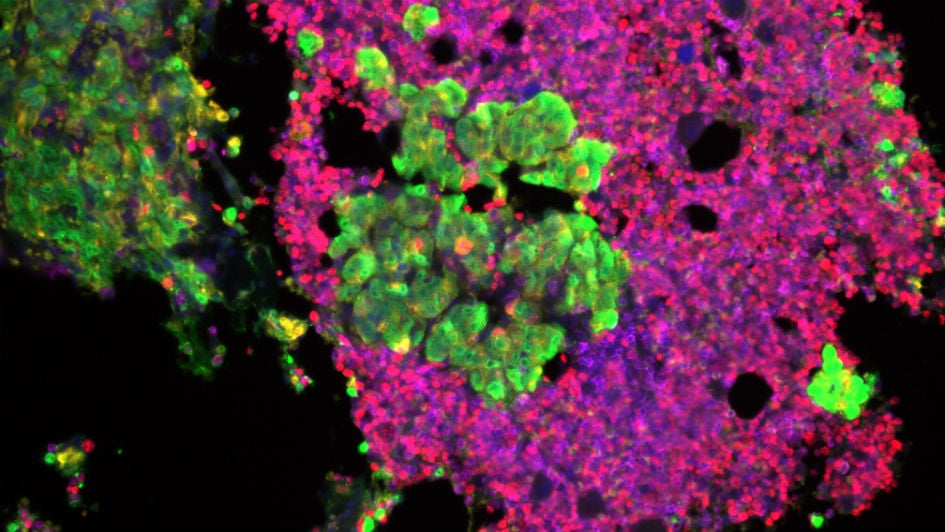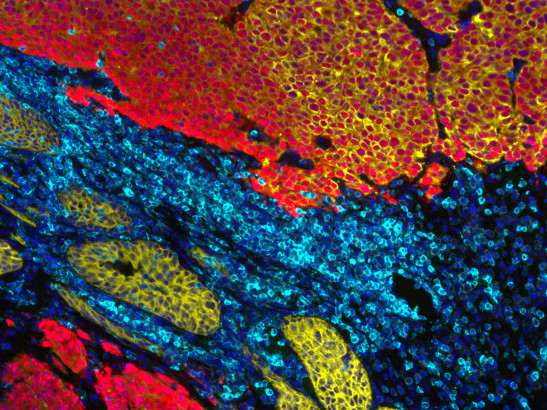
Prostate cancer cells (Credit: Mateus Crespo/Professor Johann de Bono, the ICR)
A major clinical trial has become the first to show benefits of immunotherapy in prostate cancer – for some men with advanced, otherwise untreatable disease.
Researchers showed that a subset of men who had run out of all existing options for treatment survived much longer than expected when taking immunotherapy.
Some 11 per cent of men with very advanced prostate cancer are still benefiting from the immunotherapy ‘checkpoint inhibitor’ pembrolizumab after a year – with many of them showing impressive remissions and prolonged disease control.
The international trial, led by a team at The Institute of Cancer Research, London, and The Royal Marsden NHS Foundation Trust, could lead to a subset of prostate cancers joining the list of cancers that can be treated with immunotherapy.
Of the 258 men on the trial with advanced prostate cancer receiving pembrolizumab, 38 per cent of men were still alive after a year and 11 per cent are still receiving the treatment a year after the trial began without seeing their cancer grow.
The research, presented at the American Society of Clinical Oncology annual meeting in Chicago, also revealed vital clues for how to pick out the subset of men who could benefit.
Previous trials of immunotherapy in prostate cancer had been unsuccessful – but the latest study looked back at the genetics of the tumours, and found there are some particular groups of patients that might benefit.
Overall, only 5 per cent of men in the trial saw their tumours actually shrink or disappear after treatment, but the proportion of responders was higher in a small group of men whose tumours had mutations to genes involved in repairing DNA.
The team at The Institute of Cancer Research (ICR) and The Royal Marsden believe that this subset of men with prostate cancer could benefit from immunotherapy, although more evidence is needed.
They are planning a new trial of pembrolizumab specifically to assess whether it is effective in men who have DNA repair mutations in their tumours.
Our latest research shows that within the next decade, we can make acute lymphoblastic leukaemia preventable. Your support will help us make this disease a thing of the past.
Comparing the effectiveness of pembrolizumab
Tumours that have mutations in specific genes involved in repairing DNA may acquire more genetic mutations as they multiply than other cancers.
Researchers at the ICR and The Royal Marsden believe that these ultra-mutant cancer cells may be particularly easy for the immune system to recognise, since they will look different from healthy cells.
The findings are in line with data from other cancer types, such as bowel cancer, where tumours with defects in DNA repair mutations are more susceptible to immunotherapy.
The study, funded by Merck Sharp & Dohme, compared the effectiveness of pembrolizumab in men whose tumours had a protein called PD-L1 on the surface of their cancer cells and those whose tumours did not. Targeting PDL-1 activity with an immune checkpoint inhibitor takes the ‘brakes’ off the immune system, setting it free to attack cancer cells.
But the study found testing for PD-L1 was not sufficient to tell which patients would respond to treatment. There was some evidence that testing for another protein called PD-L2 could be a better marker of whether men will respond, but this will need to be tested in further clinical trials.
Immunotherapy can benefit a subset of men
Professor Johann de Bono, Director of the Drug Development Unit at the ICR, and at The Royal Marsden NHS Foundation Trust, said:
“In the last few years immunotherapy has changed the way we treat many advanced cancers – but up to now no one had demonstrated a benefit in men with prostate cancer.
“Our study has found that immunotherapy can benefit a subset of men with advanced, otherwise untreatable prostate cancer, and these are most likely to include patients who have specific DNA repair mutations within their tumours.
“We are planning a new clinical trial, specifically in men with prostate cancer whose tumours have mutations in DNA repair genes, to see if immunotherapy can become a standard part of their treatment.
“It’s exciting that immunotherapy could offer some men more time with their loved ones where they have such advanced disease that they have run out of existing treatment options.”
Professor Paul Workman, Chief Executive of the ICR, said:
“Immunotherapy has proven to be a smarter, kinder treatment for many types of cancer – but it still only works for a minority of patients. The challenges we now face are how to predict in advance who will benefit, and how to make immunotherapy work for more people.
“One of the major challenges with immunotherapy is that we don’t have many reliable tests to pick out who will benefit. This new trial has found that testing for mutations in DNA repair genes could be valuable marker of who will respond.
“If we can prove that in the planned new trial, it should be possible to provide some men with advanced prostate cancer with an exciting new treatment option.”
See all the ICR researchers who will be present at the 2018 ASCO annual meeting. This page provides links to the abstracts from all presentations involving ICR scientists.
Personalising cancer treatment
Michael English, 72, was treated with pembrolizumab at The Royal Marsden’s West Wing Clinical Research Centre in 2016. He said:
“I was diagnosed with prostate cancer in 2005, and over a number of years I had hormone therapies, radiotherapy and chemotherapy, including treatment in research trials.
“Professor de Bono recommended pembrolizumab based on a genetic test and after only a few three-weekly cycles, we were astonished when scans showed that the tumour had become undetectable.
“As I responded so well to pembrolizumab, I was then able to have colorectal surgery (colostomy) for small holes (fistulas) in my intestine and today I’m effectively cancer-free.
“Personalising my treatment in this way, based on the genetic make-up of the tumour, essentially saved my life. With a fourth grandchild on the way, my wife and I can now plan for the next 20 years, instead of the next two.”
